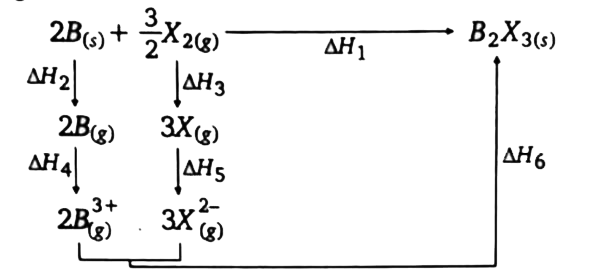Consider the following Born-Haber's cycle:

(Where ΔH1,ΔH2,ΔH3,ΔH4,ΔH5andΔH6 are in kJ/mol)
Then according to given information the correct statement is/are:
ΔH2andΔH3 are always positive
ΔH1=2ΔH2+32ΔH3+2ΔH4+3ΔH5+ΔH6
Second electron gain enthalpy of X is negative
ΔH1 must be negative for formationn of B2X5(s)
The correct Answer is:A, B, D
⇒ΔH1=2ΔH2+32ΔH3+2ΔH4−3ΔH5⇒second electron gain enthalpy of X will be positive.
Topper's Solved these Questions
- PERIODIC PROPERTIESBOOK - VK JAISWALCHAPTER - PERIODIC PROPERTIESEXERCISE - MATCHTHE COLUMN
5 Videos
- PERIODIC PROPERTIESBOOK - VK JAISWALCHAPTER - PERIODIC PROPERTIESEXERCISE - SUBJECTIVE PROBLEMS
22 Videos
- PERIODIC PROPERTIESBOOK - VK JAISWALCHAPTER - PERIODIC PROPERTIESEXERCISE - ASSERTION-REASON TYPE QUESTIONS
35 Videos
- p-BLOCK ELEMENTSBOOK - VK JAISWALCHAPTER - p-BLOCK ELEMENTSEXERCISE - SUBJECTIVE PROBLEMS
36 Videos
- QUALITATIVE INORGANIC ANALYSISBOOK - VK JAISWALCHAPTER - QUALITATIVE INORGANIC ANALYSISEXERCISE - SUBJECTIVE PROBLEMS
5 Videos
Similar Questions
Consider the following reaction:
(i) O(g)+e−→O−(g),ΔH1
(ii) F(g)+e−→F−(g),ΔH2
(iii) Cl(g)+e−→Cl−(g),ΔH3
(iv) O−(g)+e−→O2−(g),ΔH4
then according to given information the correct statement is/are:
View SolutionConsider the following reaction:
(i) O(g)+e−→O−(g),ΔH1
(ii) F(g)+e−→F−(g),ΔH2
(iii) Cl(g)+e−→Cl−(g),ΔH3
(iv) O−(g)+e−→O2−(g),ΔH4
then according to given information the correct statement is/are:
View Solution
Knowledge Check
The equation ΔH=ΔH1+ΔH2ΔH3
AKirchoff s equationBvant't Hoff isothermCvan 't Hoff isochoreDHess's lawConsider the following reactions
(i) A(s)→A(g):ΔH1
A(g)→A+(g):ΔH2
A+(g)→A2+(g):ΔH3
then according to the given information, select the correct statement(s)AΔH1,ΔH2 and ΔH3 are always positiveBΔH1 is negative where as ΔH2 and ΔH3 are positveCΔH3 is more positive than ΔH2DΔH3 represents third ionisation energy of element 'A'Consider the following reaction:
(i) O(g)+e−→O−(g),ΔH1
(ii) F(g)+e−→F−(g),ΔH2
(iii) Cl(g)+e−→Cl−(g),ΔH3
(iv) O−(g)+e−→O2−(g),ΔH4
then according to given information the correct statement is/are:AΔH3 is more negative than ΔH1andΔH2BΔH1 is less negative than ΔH2CΔH1,ΔH2andΔH3 are negative whereas ΔH4 is positiveDΔH1andΔH3 are negative whereas ΔH2andΔH4 positive
Consider the following conversions:
(i) O(g)+e−→O−(g),ΔH1
(ii) F(g)+e−→F−(g),ΔH2
(iii) Cl(g)+e−→Cl−(g),ΔH3
(iv) O−(g)+e−→O2−(g),ΔH4
the according to given information the incorrect statement is :
View SolutionConsider the following conversions:
(i) O(g)+e−→O−(g),ΔH1
(ii) F(g)+e−→F−(g),ΔH2
(iii) Cl(g)+e−→Cl−(g),ΔH3
(iv) O−(g)+e−→O2−(g),ΔH4
the according to given information the incorrect statement is :
View SolutionConsider the following reaction:
(i) O(g)+e−→O−(g),ΔH1
(ii) F(g)+e−→F−(g),ΔH2
(iii) Cl(g)+e−→Cl−(g),ΔH3
(iv) O−(g)+e−→O2−(g),ΔH4
then according to given information the correct statement is/are:
View SolutionConsider the following conversions:
(i) O(g)+e−→O−(g),ΔH1
(ii) F(g)+e−→F−(g),ΔH2
(iii) Cl(g)+e−→Cl−(g),ΔH3
(iv) O−(g)+e−→O2−(g),ΔH4
the according to given information the incorrect statement is :
View SolutionConsider the following conversions:
(i) O(g)+e−→O−(g),ΔH1
(ii) F(g)+e−→F−(g),ΔH2
(iii) Cl(g)+e−→Cl−(g),ΔH3
(iv) O−(g)+e−→O2−(g),ΔH4
the according to given information the incorrect statement is :
View Solution
